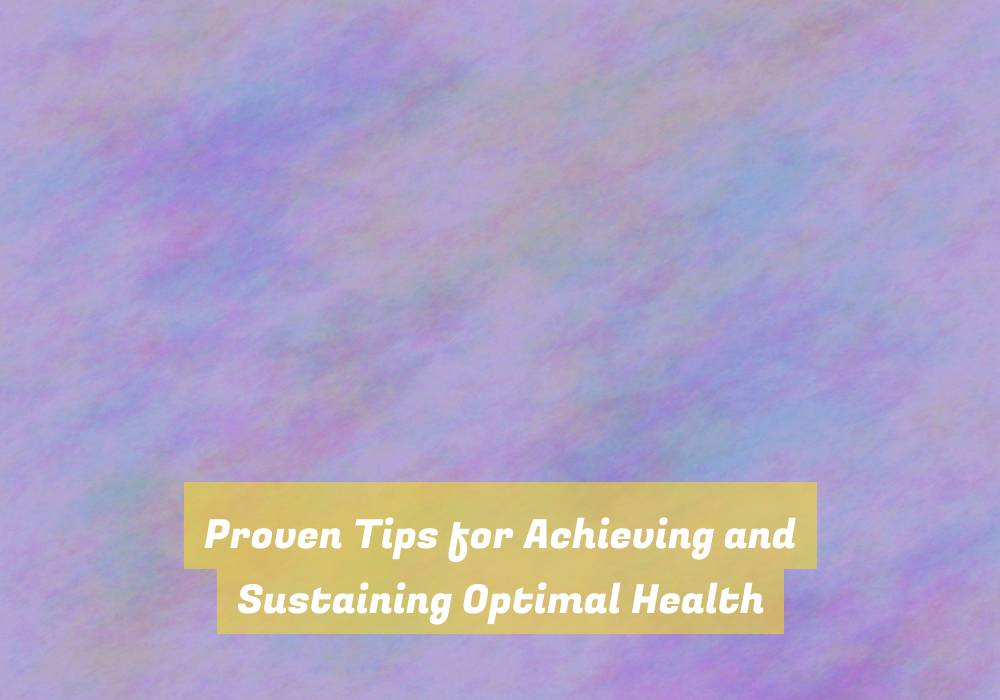Proven Tips for Achieving and Sustaining Optimal Health
YouG??ve probably heard countless tips and tricks for achieving optimal health, but thereG??s a reason why some stand the test of time. When it comes to your well-being, making simple, sustainable changes can have a profound impact on your overall health.
From the food you eat to how you manage stress, every aspect of your lifestyle plays a crucial role in shaping your health. But what are the proven tips that can help you achieve and sustain optimal health?
LetG??s explore some practical strategies that can make a real difference in how you feel and function every day.
Nutrition and Diet
For optimal health, maintaining a well-balanced and nutritious diet is essential. Your body requires a variety of nutrients to function at its best, so itG??s important to incorporate a diverse range of foods into your meals.
Ensure that your diet includes plenty of fruits and vegetables, lean proteins, whole grains, and healthy fats. These foods provide essential vitamins, minerals, and antioxidants that support your overall health and well-being.
Strive to limit your intake of processed foods, sugary snacks, and high-fat, high-sodium items, as these can have a negative impact on your health.
In addition to the types of foods you consume, portion control is also crucial for maintaining a healthy diet. Be mindful of your serving sizes, and try to avoid overeating. Eating slowly and paying attention to your bodyG??s signals of fullness can help prevent overindulgence.
Furthermore, staying hydrated is an important aspect of a nutritious diet. Aim to drink plenty of water throughout the day to support your bodyG??s various functions.
Physical Activity
Regular physical activity helps improve your overall health and well-being. ItG??s essential for maintaining a healthy weight, reducing the risk of chronic diseases, and promoting strong bones and muscles. Aim for at least 150 minutes of moderate-intensity aerobic activity, such as brisk walking or cycling, each week.
Additionally, including muscle-strengthening activities, like lifting weights or doing push-ups, at least two days a week is crucial for overall health. Engaging in regular physical activity also enhances your mental well-being by reducing feelings of anxiety and depression, and promoting better sleep.
Incorporating physical activity into your daily routine doesnG??t have to be daunting. Simple steps like taking the stairs instead of the elevator, walking or cycling to nearby destinations, and taking active breaks during the workday can make a significant impact. Find activities that you enjoy, such as dancing, swimming, or playing a sport, as this will make it easier to stay motivated and consistent.
Stress Management
Incorporating physical activity into your daily routine doesnG??t have to be daunting; managing stress is also crucial for your overall health and well-being. Finding effective ways to manage stress is essential for maintaining optimal health.
When you experience stress, your body releases hormones that can have a negative impact on your physical and mental well-being. Chronic stress can lead to a weakened immune system, increased risk of heart disease, and other serious health issues. Therefore, itG??s important to incorporate stress-reducing activities into your daily life.
Engaging in activities such as yoga, meditation, deep breathing exercises, or spending time in nature can help alleviate stress and promote relaxation. Additionally, maintaining a healthy work-life balance, setting realistic goals, and seeking social support are important strategies for managing stress.
ItG??s crucial to identify the sources of stress in your life and develop healthy coping mechanisms to effectively deal with them. By prioritizing stress management, you can significantly improve your overall health and well-being.
Quality Sleep
Quality sleep is essential for your overall health and well-being, playing a crucial role in physical and mental functioning. When you consistently get 7-9 hours of quality sleep each night, your body and mind are better equipped to handle the challenges of the day.
During sleep, your body repairs and rejuvenates tissues, muscles, and organs, while your brain consolidates memories and processes information. Quality sleep also supports your immune system, helping to defend against illness and infection. Additionally, it regulates hormones that control appetite, metabolism, and stress response, which are all vital for maintaining a healthy weight and managing stress.
Poor sleep, on the other hand, is linked to an increased risk of heart disease, diabetes, and depression. To improve your sleep quality, establish a regular sleep schedule, create a relaxing bedtime routine, and ensure your sleep environment is conducive to rest.
Conclusion
So, remember to focus on your nutrition, stay active, manage your stress, and prioritize quality sleep to achieve and sustain optimal health.
ItG??s all about making small, sustainable changes and being consistent with your efforts.
YouG??ve got this! Keep taking care of yourself and prioritizing your health, and youG??ll reap the benefits for years to come.
Keep up the good work!








I completely resonate with your point about sustainable changes being the key to optimal health. It’s so easy to get caught up in fad diets or quick fixes, but they usually lead to frustration and burnout. I’ve spent quite a bit of time experimenting with my own eating habits, and I’ve found that incorporating a variety of whole foods not only improves my mood but also keeps my energy levels steady throughout the day.